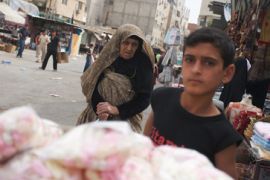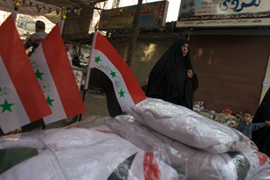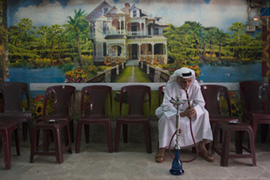Iraqi refugees reject return offer
A government initiative struggles to entice those who fled Iraq for Syria to return home.

 |
| According to the UNHCR, about two million Iraqis are living as refugees outside the country, many in neighbouring Syria |
Maruj has not been back to her country since an armed group kidnapped her son and blew up her house in Mosul four years ago. Today, she sits outside the UN refugee agency’s (UNHCR) office in Damascus, thumbing the cross that hangs around her neck.
After being told that they could not guarantee that she would be relocated to Canada, she looks defeated and hopeless.
“There is no solution for us,” she says, gazing vacantly at the throngs of people lined up at the door. “The government says it will pay us to go back to Iraq, but we would be crazy to return now.”
In a $195 million initiative to entice refugees to come home, the Iraqi government is offering one million Iraqi dinars, around $850, and free plane tickets to any family wishing to go back.
“They just want people to believe that they are in control of the situation, that Iraq is safe, and that everything is over,” Maruj says. “But it’s not over.”
Fleeing sectarian violence
Since the Iraqi embassy announced the initiative, 13,000 Christians have left Maruj’s home city, according to UN figures, fleeing armed sectarian groups similar to those that drove her to Syria four years ago.
Like many Iraqis in Syria, her family is facing an increasingly dire situation. Forbidden to work in Syria, Iraqis tend to stay only as long as their savings last. Then, many have to return to Iraq to find work.
| In video | ||
Two lines of |
Maruj’s husband, once an electrician for the coalition forces, goes back to Iraq occasionally to earn money.
“Usually, he can’t stay for more than one or two months because he is threatened by militias. How can the government expect us to live there?”
Since the embassy announced the programme on October 7, 322 of Syria’s estimated one million refugees have returned on the government funded Iraqi Airways flights.
The Iraqi embassy claims 2,000 to 3,000 refugees are registered to return, while the UNHCR says that by the beginning of last week, they had only processed 245 people.
Reconstructing Iraq
“We will continue bringing people back for six months if we need to – as long as it takes,” said an official at the Iraqi embassy in Damascus who asked not to be named because she was not authorised to speak to the media.
She said the current initiative is more comprehensive than last November’s, when the government offered free trips on convoys to Baghdad.
Now, the government is attempting to get refugees’ occupied homes back too, paying six months’ rent – up to $300 per month – to families that leave houses that are not theirs, the official said.
 |
| A woman walks past a stall selling Iraqi flags in Damascus’ Seyda Zaynab neighbourhood |
“The Iraqi government would like its people to return to participate in the reconstruction of Iraq,” she said.
About two million Iraqis are currently living as refugees outside the country, according to UNHCR data.
Much of the educated middle class left the country after being targeted by kidnappers in search of high ransoms. Many analysts say that because of their escape, Iraq is lacking the qualified professionals the country needs in order to recover.
But many Iraqis say it feels too risky to return while refugees are continuing to enter Syria. According to a UNHCR report, around 400 people have sought refuge in Syria in the past week alone, more than the Iraqi government has sent back over the past three weeks.
Asked whether it was safe to repatriate refugees as 13,000 people flee sectarian violence in northern Iraq, Ahmed Saad, an Iraqi embassy spokesman, replied, “The situation is safe. The Iraqi army is taking control of Iraqi security.
“The media is always talking about explosions and IEDs, but the situation has greatly improved. Even the Americans are saying that. The number of people being killed is nothing compared to what it was before.”
According to Iraq Body Count, an organisation that counts reported civilian deaths, civilian casualties have decreased remarkably since early 2007, but according to their figures, more civilians are being killed in suicide attacks and vehicle bombs every day than in 2005 and the number of deaths per day from gunfire and executions are barely under their 2004 levels.
Uncertain return
The UN Refugee Agency, while offering up to $500 in assistance to refugee families wishing to return, says the situation is not appropriate for repatriation.
“We are not promoting or encouraging Iraqis to return,” says Dalia al-Achi, a UNHCR public information assistant in Damascus. “Our own staff in Baghdad cannot move freely, so how could we encourage people to go there?”
While some refugees have been going back to Iraq over the past year, roughly the same number has been entering Syria, says al-Achi.
Under the din of teashops and the hum of markets in an Iraqi-dominated suburb of Damascus, men grumble about their government’s attempts to lure them back.
Dayyaa Adib, once a government employee in Baghdad, now sells caps and wristbands emblazoned with the Iraqi flag from a tiny stall in a Damascus suburb, under the golden dome of the revered Sayida Zaynab shrine.
He says the money the government is offering refugees is not enough to pay his way through what he says is an extremely corrupt job market.
“I want to go back, but it will cost me $1,000 just to get a job in Baghdad,” says Adib.
Iraq was ranked the most corrupt country in the Arab world in the international watchdog Transparency International’s 2008 corruption perception index.
 |
| Despite the enticements, many Iraqi refugees feel that it is too risky to return home |
Adib says: “Everyone in Iraq knows that you need to pay bribes to get government jobs. That is how it was under Saddam and that is how it is now.”
In a nearby pool hall, one young Iraqi man who asked not to be named says his family will be returning in four days, but they will not be taking the government’s $850.
“If we take the money, we can’t come back here,” he says. “We won’t even be considered refugees anymore. We want to try going back to Baghdad, but we won’t give up our chance to return if it is too dangerous.”
In exchange for the money and flight, Iraqis are required to give up their Syrian residency permits as well as their refugee status with the UN.
Threatened
At a nearby tea stall, an Iraqi photojournalist smokes cigarettes as the sun sets. When asked what he thinks about going back to Iraq, he laughs disdainfully. “I just came here from Baghdad, fleeing for my life ten days ago. What do you want me to say about return?”
This summer, he had two separate letters tacked to his door, calling him a traitor for working as a journalist in the Green Zone. The notes said that if he did not quit his job and leave his home immediately, he would be ravaged by dogs, then decapitated.
As he fiddles with a camera, he calls his son over and tells him to lift up the legs of his trousers, revealing scars on his feet and ankles. “This is what happened after I got the letter. They kidnapped and beat him.”
After that, masked men came to his home while he was not there and beat the women in the house. His wife later received seven stitches, one daughter had several teeth knocked out, and another lost an eye.
Then in mid-July, his brother, who resembles him, was killed – shot in the back of the head while driving his car.
“We had to move to the Green Zone after that,” he says. “We had nowhere else to go.”
This month, he approached the Iraqi government and the US military to ask for protection.
“They told me it is too dangerous here and there was nothing they could do for me,” he says. “They said I should get out of Iraq to save my life.”
All photos by Shane Bauer
